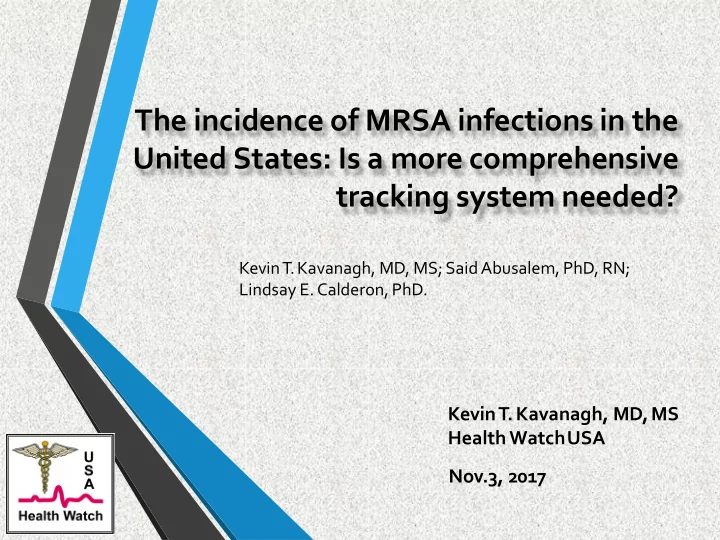

The incidence of MRSA infections in the United States: Is a more comprehensive tracking system needed? Kevin T. Kavanagh, MD, MS; Said Abusalem, PhD, RN; Lindsay E. Calderon, PhD. Kevin T. Kavanagh, MD,MS Health WatchUSA Nov.3, 2017
United States MRDO Tracking Systems • National Healthcare Safety Network (NHSN) – Hospital Compare. Hospitals which participate in Medicare’s Prospective Payment System. • Emerging Infection Program (EIP) – Nine metropolitan areas. • Billing Records – University Healthcare Consortium (UTC) • The Surveillance Network (TSN) - Outpatient Laboratory Data • US Military and Veterans’ Administration HealthSystems
United States MRDO Tracking Systems • Different SubjectPopulations”. Military Facilities, MedicalCenters • General Population, Pediatric Population • Restricted GeographicAreas • • Different HAI Definitions. HospitalOnset MRSA (HealthcareVS.CommunityAcquired). • Infections • All MRSA • Bloodstream • Invasive MRSA • Laboratory Cultures (SurrogateMetric) • • Confusing Terminology: “Community OnsetHealthcare Associated”.
United States MRDO Tracking Systems This MRSA infection would NOT be defined as Invasive.
Incidence of MRSA Blood StreamInfections
Incidence of MRSA Blood StreamInfections
Incidence of MRSA Table 1 NHSN data from https://data.medicare.gov/data/hospital-compare Average National AverageFacility Numberof SIR SIR Facilities AcquisitionDates 1/1/2013 to 0.96766 0.95876 1666 9/30/2013 1/1/2013 to 0.94380 0.91540 1889 12/31/2013 7/1/2013 to 0.91766 0.91484 1906 6/30/2014 10/1/2013 to 0.90195 0.89426 1904 9/30/2014 1/1/2014to 0.89422 0.89134 1916 12/31/2014 4/1/2014 to 0.90124 0.89717 1911 3/31/2015 7/1/2014 to 0.91835 0.92568 1899 6/30/2015 10/1/2014 to 0.94811 0.96378 1825 9/30/2015 1/1/2015 to 0.98740 0.98812 1830 12/31/2015
Is MRSA on the Rise in the United States ?? • CDC, said NO! • Due to aberrations caused by changing methodology on how to track community acquired infections. • EIP data did not show an increase. • But we are NOT on Track for a 50% Reduction in Bloodstream Infections by 2020!!
BUT WAITE?? “Due to aberrations caused by changing methodology on how to track community acquired infections.” NHSN down adjusts hospital MRSA infections rates if there is a high rate in the community. We also adjust for bed size and being a teaching hospital.
BUT WAITE?? The EIP Data still showed an increase in Hospital Acquired MRSA. • It was not statistically significant • But only a portion (six of nine) of EIP Labs were analyzed.
EveryoneAgrees!! We are no where near on track for meeting the 2020 goal of a 50% reduction in MRSA Bloodstream Infections.
Why Needed • Unfortunately, most research on common protocols used to control MRSA have significant research integrity problems which has clouded policy formation. Bad Data, Bad Policy, Dead Patients
Why Needed • Similar to the FDA, post protocol implementation monitoring is desperately needed. We need to know what works and what does not. • For Example: Chlorhexidine Bathing VS. Surveillance andIsolation
Data Integrity Concerns • World Health Organizations Recommendations on Surgical SiteAntisepsis. -- Changing of date window for study inclusion -- Leaving a large negative study out -- Including studies whose concentration of alcohol antiseptics is not known. • TwoAntisepticsVS.OneAntiseptic (Chlorhexidine plusAlcoholVS. Povidone IodineAlone). • Charles DenhamAffair. • Daily ChlorhexidineBathing -- Apparent Spinning ofdata -- Changing of metrics after trial initiation (major metric added after trial completion. -- Use of a surrogate metric for the primary outcome.
Recommend
More recommend